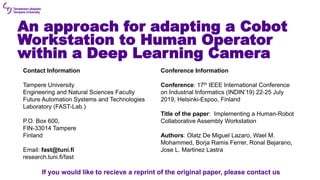An approach for adapting a cobot workstation to human operator within a deep learning camera
- 1. An approach for adapting a Cobot Workstation to Human Operator within a Deep Learning Camera Contact Information Tampere University Engineering and Natural Sciences Faculty Future Automation Systems and Technologies Laboratory (FAST-Lab.) P.O. Box 600, FIN-33014 Tampere Finland Email: fast@tuni.fi research.tuni.fi/fast Conference Information Conference: 17th IEEE International Conference on Industrial Informatics (INDINˇŻ19) 22-25 July 2019, Helsinki-Espoo, Finland Title of the paper: Implementing a Human-Robot Collaborative Assembly Workstation Authors: Olatz De Miguel Lazaro, Wael M. Mohammed, Borja Ramis Ferrer, Ronal Bejarano, Jose L. Martinez Lastra If you would like to recieve a reprint of the original paper, please contact us
- 2. An approach for adapting a Cobot Workstation to Human Operator within a Deep Learning Camera 17th IEEE International Conference on Industrial Informatics INDIN 2019 22-25 July 2019, Helsinki-Espoo, Finland Olatz De Miguel Lazaro, Wael M. Mohammed, Borja Ramis Ferrer, Ronal Bejarano, Jose L. Martinez Lastra
- 3. Outline ? Introduction ? Objective ? Approach ? Implementation ? Experiment ? Conclusion 24.05.2019 3
- 5. Objective Propose the adaptation of robots to the skills of human operators in order to implement an efficient, safe and comfortable synergy between robots and humans working at the same workspace. Cobot image: http://www.manufacturinglounge.com/deciphering_industry_4_part2/ 24.05.2019 5
- 6. Approach Computer Vision ? Deep Learning Use a camera to recognize the human operator that collaborates with the robot. The user profile is processed and serves as an input to a module in charge of adapting specific features of the robot. In this manner, the robot can adapt its speed according to the skills of the user or stopping the process at any time that the worked leaves unexpectedly the workstation 24.05.2019 6
- 8. Implementation ? ABBˇŻs collaborative robot YuMi ? AmazonˇŻs DeepLens video camera and development platform o Integrated in AWS Cloud ? To cover the camera: 3D printed head o Adapted from open source robot POPPY Image: https://aws.amazon.com/deeplens/ 24.05.2019 8
- 9. Implementation AWS Lambda Serverless computing service that runs code and interacts with other AWS services S3 Bucket Cloud storage services. Stores face images from video feed AWS Rekognition Facial recognition cloud service. Extracts facial data from images and compares it to faces in collection DynamoDB Database service. Stores names of operators and data like speed, height etc Simple Notification Service (SNS) Messaging service. Sends message with operatorˇŻs data from AWS Cloud to gateway AWS Cloud 24.05.2019 9
- 11. Experiment ? Times (from face detection to movement of YuMi) o Average: 12s ? Accuracy: o Recognition of operators 100% accurate ? Limitation: o AWS server sometimes malfunctions or exits Lambda before is finished 24.05.2019 11
- 12. Conclusion ? HRC requires adaptation of the process to the human operator ? DL provides a fast tool for adapting the tasks without changing the cobotˇŻs code ? With adaptation ? operations tailored to the operator 24.05.2019 12













